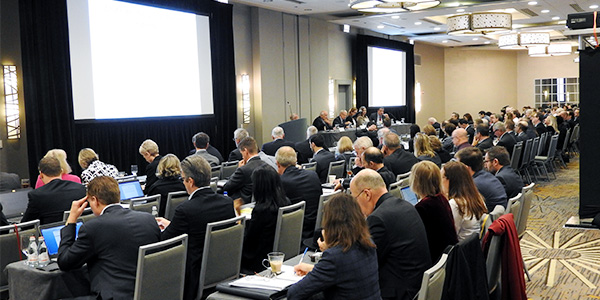By Rory D. Sweeney
CHICAGO — Following the 2011 Fukushima nuclear disaster, German leaders ordered an immediate shutdown of the country’s oldest nuclear reactors and devised a plan to meet 80% of its power needs through renewables by 2050. Such a transition is unlikely in the U.S., attendees found out at a conclave last week of PJM stakeholders and their German counterparts.
The two-day Energy Trends Forum immediately followed the annual meeting of the Organization of PJM States Inc. (OPSI) and was sponsored by OPSI and Germany’s Federal Ministry for Economic Affairs and Energy.
“The biggest question will be: Will politics stay out of the game?” said Frank Peter, the deputy executive director of Agora Energiewende, a German think tank supporting the country’s planned transition to low-carbon energy production.
“What we’ve kind of found in the U.S. is that’s an unrealistic expectation,” said former FERC Commissioner Tony Clark, a senior adviser with D.C. law firm Wilkinson Barker Knauer.
Differences
Annegret Groebel, who heads international coordination for Germany’s Federal Network Agency, said the country’s transition has been aided by a generation surplus. It has less transmission congestion and less granular pricing because it uses a zonal system, while PJM’s LMP is based on a nodal framework.
Germany has also unbundled the industry so that owners of transmission, distribution and generation assets are separate. In PJM, a holding company such as Exelon can own all asset classes through subsidiaries.
Germans are also willing to spend whatever it takes to interconnect renewables and maintain extremely high reliability, German representatives said.
In PJM, state interests can inhibit development of transmission from renewable resources to load centers. “If Pennsylvania doesn’t want energy from Iowa, then those lines serve no purpose,” PJM’s Steve Herling said.
Germany has experienced one grid-related outage since 1990, and consumers have resisted suggestions to reduce costs that might increase that risk.
Changes
PJM’s cost sensitivity might shift, if staff have anything to say about it. Vince Duane, PJM’s senior vice president for law, compliance and external affairs, said the RTO needs “an honest discussion” about maintaining reliability at least cost to reflect consumers’ actual interests.
“I hope what will evolve is a dialogue in the very near term that will examine that,” he said. Last week, PJM released the summary of a study that showed the RTO could face outages under extreme winter weather, gas pipeline disruptions and “escalated” resource retirements. Officials said the findings support the need to compensate generators based on their “fuel security.” (See related story, PJM Begins Campaign for ‘Fuel Security’ Payments.)
The transition might not be easy. Duane noted that one German representative said the “broader value proposition of decarbonization” is a “cleaner, quieter, more elegant world.”
“Those are three terms that have never been used to describe Americans, so we have our work cut out for us,” he said.
More to Come
While Germany has made major strides in its transition, there is still a ways to go, panelists said.
Both American and German panelists noted that surcharges on customer bills for things like system upgrades and resource subsidies are politically expedient but dull market signals that might help consumers reduce demand.
“There’s nothing greener than the electron you don’t produce,” Duane said. “At the end of the day, getting consumers to see prices and respond to prices … has to be a critical policy objective. … At least in this country, we still have a tremendous amount of dumb, discretionary load that could be curtailed, but … people don’t see a reason economically to do that, and they won’t see that reason if a lot of the electricity bill is basically tax.”
Thorsten Herdan, director-general for energy policy, heating and efficiency in the Ministry for Economic Affairs and Energy, noted in his opening remarks that the country’s energy transition focused on electricity — ignoring 80% of the country’s energy use.
“The building stock has not been addressed that much that we can meet our targets for the building sector,” he said. “We have just forgotten the transport sector. That was one of our biggest mistakes. … What are we going to do with what’s left? Are we going to electrify it? I have my doubts.”









